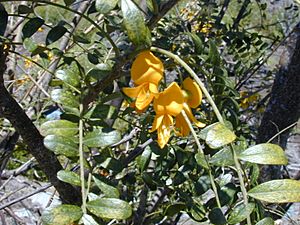Mamane facts for kids
Quick facts for kids Mamane |
|
|---|---|
 |
|
| Conservation status | |
|
Not evaluated (IUCN 3.1)
|
|
| Scientific classification | |
| Kingdom: | |
| (unranked): | |
| (unranked): | |
| (unranked): | |
| Order: | |
| Family: | |
| Genus: | |
| Species: |
S. chrysophylla
|
| Binomial name | |
| Sophora chrysophylla (Salisb.) Seem.
|
|
| Synonyms | |
|
Edwardsia chrysophylla Salisb. |
|
The Māmane (Hawaiian language) is a special type of shrub or tree found only in Hawai'i. It belongs to the Sophora genus, which is part of the pea family. You can even grow Māmane in gardens!
Contents
What is Māmane?
The Māmane plant is very interesting because it can grow in many different shapes and sizes. This is called being polymorphic. It can be a small shrub or a tall tree, reaching up to 15 meters (about 50 feet) high.
Where Māmane Grows
Māmane grows quickly on every island in the Hawaiian archipelago. Because it grows so differently depending on where it is, botanists (plant scientists) have described many local forms of the plant. One of these forms is called S.unifoliolata.
Māmane and Hawaiian Wildlife
Māmane trees are super important for many animals in Hawai'i, especially birds.
Māmane and Honeycreepers
Hawaiian honeycreeper birds love to visit Māmane plants. They drink the sweet nectar from the flowers. This helps the Māmane plant spread its pollen, which is good for the plant.
Māmane and the Palila Bird
The Māmane tree is especially vital for a rare bird called the Palila (scientific name: Loxoides bauilleui). The Palila bird eats the unripe seeds of the Māmane. These seeds are its main food source.
If Māmane trees were to disappear from Hawai'i, the Palila bird would also likely disappear. This is why the Palila bird is an endangered species. Protecting Māmane trees helps protect the Palila bird too!
Gallery
Images for kids
See also
 In Spanish: Mamane para niños
In Spanish: Mamane para niños
 | Roy Wilkins |
 | John Lewis |
 | Linda Carol Brown |






